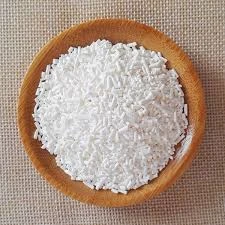
Role of Anti-Caking Agents in Enhancing Salt Quality and Functionality
Understanding Anticaking Agents in Salt Importance, Types, and Safety
Salt is a staple in kitchens and industries around the world. Its primary function is to enhance flavor, but the presence of moisture can turn this essential ingredient into a clumpy, unusable mass. This is where anticaking agents come into play. These additives ensure that salt remains free-flowing and easy to dispense. In this article, we will explore the importance of anticaking agents in salt, the common types used, and the safety considerations associated with these substances.
The Importance of Anticaking Agents
Anticaking agents serve several crucial roles in the preservation of salt's quality and usability. The primary reason for their inclusion is to prevent the formation of lumps caused by moisture absorption. When salt particles come into contact with water, they can stick together, leading to clumps that can be difficult to break apart. This is particularly troublesome for consumers and food industries that require precise measurements.
In addition to maintaining a desirable texture, anticaking agents help prolong the shelf life of salt. By controlling moisture absorption, these additives reduce the risk of spoilage and degradation. This is especially important in humid environments where the likelihood of caking is heightened. With the aid of anticaking agents, manufacturers can provide consumers with consistently high-quality salt products.
Common Types of Anticaking Agents
There are several types of anticaking agents commonly used in salt production. Some of the most prevalent include
1. Calcium Silicate A naturally occurring mineral, calcium silicate is often favored for its effectiveness in absorbing moisture. It works by coating salt particles, creating a barrier that keeps water from causing clumping.
2. Magnesium Carbonate This compound also acts as an effective moisture absorbent. It is less soluble than sodium chloride, making it a suitable anticaking agent for salt.
3. Sodium Aluminosilicate A synthetic compound, sodium aluminosilicate effectively reduces caking by adsorbing humidity. It is frequently found in table salt and various processed salts.
anticaking agent in salt

4. Silicon Dioxide Often derived from sand, silicon dioxide is another widely used anticaking agent. It is particularly valued for its ability to maintain the flowability of salt, even in adverse conditions dampness.
5. Talc A naturally occurring mineral, talc is sometimes used as an anticaking agent. However, its use is being scrutinized due to potential health risks associated with impurities.
While these agents serve a similar purpose, their effectiveness and suitability can vary based on the specific salt product and its intended application.
Safety Considerations
The use of anticaking agents in salt has raised questions regarding safety and health implications. Most of the agents employed are generally recognized as safe (GRAS) by regulatory agencies like the Food and Drug Administration (FDA) in the United States. However, it is crucial for consumers to stay informed about the products they purchase and their ingredients.
Many people are now paying closer attention to food additives due to rising health consciousness. It's important to note that the quantities of anticaking agents used in salt are typically very low. These substances appear only in small amounts, well within safety limits established by health authorities.
For individuals seeking to minimize their intake of additives, there are options available. Some brands offer organic or natural salts that forgo the use of anticaking agents altogether. However, this may come at the cost of increased caking, requiring users to store the salt in a dry environment or use a salt shaker designed to prevent clumping.
Conclusion
Anticaking agents play a vital role in the storage and usability of salt, ensuring it remains a functional ingredient in kitchens and food processing settings. Their ability to prevent clumping and prolong shelf life is essential for both consumers and manufacturers. While safety is paramount, transparency about the specific agents used and their quantities can empower consumers to make informed choices. As the food industry continues to evolve, the balance between functionality and health-consciousness will dictate the ongoing relevance of anticaking agents in salt.
-
Aluminum Hydroxide: Quality Gels & Dried Gel AntacidNewsAug.31,2025
-
Buy High-Quality Trichloroisocyanuric Acid for Sale | TCCA 90% SupplierNewsAug.30,2025
-
Pure Sodium Dichloroisocyanurate Dihydrate | Powerful DisinfectantNewsAug.29,2025
-
Industrial Chemicals: Quality & Purity for Every IndustryNewsAug.28,2025
-
Nitrile Rubber Honoring Strict Production StandardsNewsAug.22,2025
-
Aspartame Ingredients Honoring Food Safety ValuesNewsAug.22,2025
-
Fertilizer for Balanced Plant NutritionNewsAug.22,2025
Hebei Tenger Chemical Technology Co., Ltd. focuses on the chemical industry and is committed to the export service of chemical raw materials.
-

view more DiethanolisopropanolamineIn the ever-growing field of chemical solutions, diethanolisopropanolamine (DEIPA) stands out as a versatile and important compound. Due to its unique chemical structure and properties, DEIPA is of interest to various industries including construction, personal care, and agriculture. -

view more TriisopropanolamineTriisopropanolamine (TIPA) alkanol amine substance, is a kind of alcohol amine compound with amino and alcohol hydroxyl, and because of its molecules contains both amino and hydroxyl. -

view more Tetramethyl Thiuram DisulfideTetramethyl thiuram disulfide, also known as TMTD, is a white to light-yellow powder with a distinct sulfur-like odor. It is soluble in organic solvents such as benzene, acetone, and ethyl acetate, making it highly versatile for use in different formulations. TMTD is known for its excellent vulcanization acceleration properties, which makes it a key ingredient in the production of rubber products. Additionally, it acts as an effective fungicide and bactericide, making it valuable in agricultural applications. Its high purity and stability ensure consistent performance, making it a preferred choice for manufacturers across various industries.





